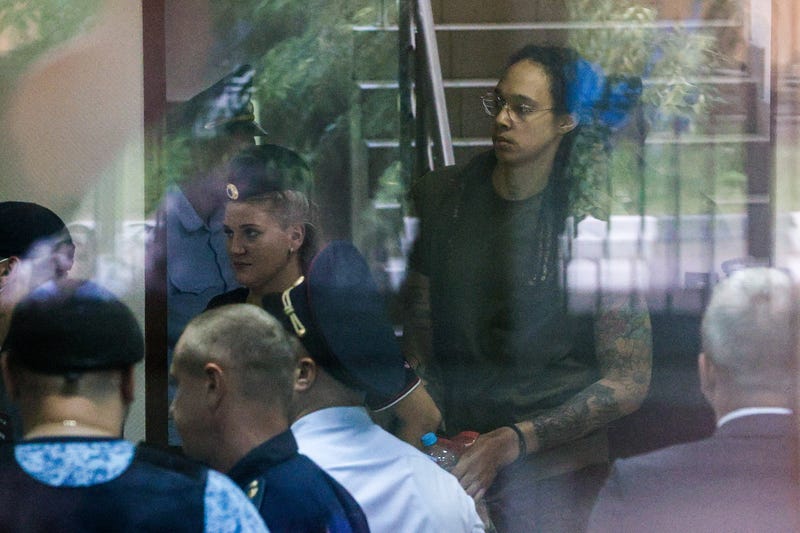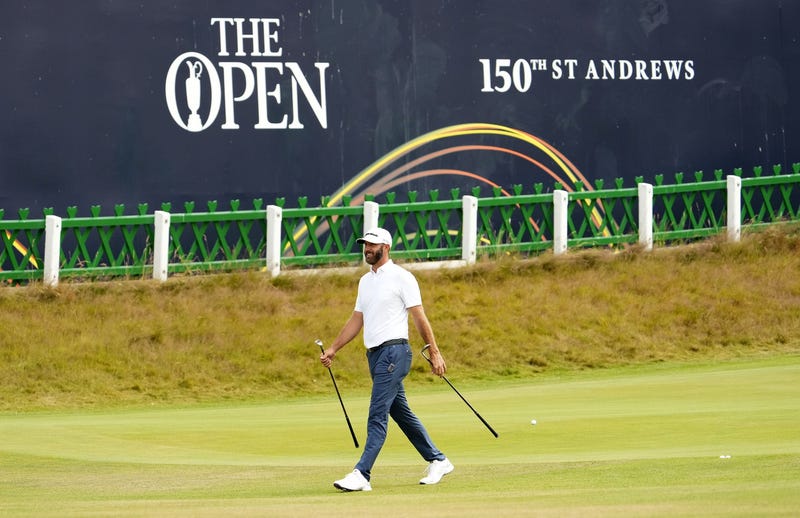
There are two major international storylines blending the worlds of sports and politics. One is the Saudi-backed golf tour led by Greg Norman that has created so much controversy, even as The Open Championship takes place this week at St. Andrews.
The other is WNBA star Brittney Griner’s detainment in Russia, and the U.S. effort to get her released and back home.
CBS News chief Washington correspondent Major Garrett joined the Chad Hartman Show for his normal Friday conversation. Garrett gave the Washington D.C. take on both of those important issues with Myron Medcalf who was in for Hartman.
Myron Medcalf: A lot of us don't understand some of the political obstacles and challenges attached to the situation. What do you think is the timeline for Brittney Griner with her chances to possibly return to the United States?
Major Garrett: My guess is, and this is only a guess, it’s definitely a hunch, I would say sometime in the next three months. For a couple of reasons. One, she's very highly visible. The political pressure will stay on the White House. That is why we should understand the Russians are detaining her. The Russians are detaining her not because she broke the law, but because holding her has something the U.S. values, will generate political pressure and therefore will encourage the United States to trade something the Russians want. Which is someone who's held in our prison system now, and that's what's going on behind the scenes. What would be the contours of a either direct or indirect prisoner swap?
The reason the Russians stopped Brittney Griner is because they have people here in the United States that they want traded back, and they know the only way they can get them is wrongfully detained Americans of high visibility, high prominence, in order to apply the political pressure on the administration. Which is exactly what's happened the last month. Elevate the case and make it worthwhile where the American public says, ‘okay, we'll trade someone just to get Brittany Griner back home.’ And that's what I think is going to play out, but not immediately. She's got to go through the court system. Having pled guilty, that sort of puts things in a satisfactory place for the Russians. Like, our system works. You respected our system even though it's a more or less corrupt system with a 99% conviction rate and no overturning on appeal. Because there's almost no appeals. So it's all a pawn, it's all a chess game, and we should remind ourselves politically and otherwise the Russians are very good at chess.
There's another, lesser known but still somewhat highly visible American Paul Whelan, a Marine that has been there for nearly four years on completely fabricated espionage charges. If there's a twofer that could be done that way, I think the administration would actually work on that. Those are the two Americans in Russia, the president has called their families in the last month or so. I think they're trying to work out something that involves both of those, and maybe one Russian who's in our federal prison system.
Medcalf: You have covered these issues for a long time. How does the administration know that it's not being played? That even if you follow all the steps, accommodate what Russia wants, that at the end of the day we'll get what we want, which is bringing those Americans back?
Garrett: So, they know they're getting played. I mean that look, that's what happens. Americans overseas, taken captive, put through a judicial system that we don't consider valid, they're still held. The the nations that capture Americans know Americans are of high value and America, unlike their own country in certain respects, in certain circumstances will give up a lot to get them back. That's one of the benefits and one of the dangers of being a U.S. Global superpower. The United States certainly is, and when it comes to Russia, remember Brittney Griner was captured right before the invasion of Ukraine. The Russians wanted a pawn, they wanted someone of visibility, they wanted someone we would value and we would value more and more and more over time. And that's exactly what's happened.
There's been all this conversation and I'm going to defer to you in your world of sports reporting that if, as the coach of the Phoenix Mercury said, if this was LeBron James, this would have happened two weeks ago. Within two weeks, not two weeks ago. Within two weeks has been all done. Whatever it took, we have to LeBron back. Brittany is in a different category. Why was Britney even over there in the first place? Because to supplement her income as a WNBA player, she needs to play in Russia where they pay her much more money. So she was there supplementing her income because there's a very large wage disparity between WNBA players and NBA players. And so all of these things mix in, and the administration knows it's being played. But, of the people that the Russians are talking about, most have lived out most of their sentence in the United States, would not be a huge issue for us to give them back. So I think there's a trade that can be done.
But it has to be negotiated sometimes through third parties. Former New Mexico governor Bill Richardson is going to make a trip to Moscow. He's not an official representing the United States, but everyone knows that he sort of works these things out in a kind of way where no one works through him officially, but unofficially, everyone understands what he knows, and he's a pass through of information. That he's going to Moscow also gives me a sense that this is moving along and moving towards some kind of resolution.
Medcalf: I have followed Saudi Arabia's PR campaign through the controversy of the LIV Golf Tour and now this has been one of the things that the Saudi Arabian government has done to say, “hey, forget the human rights issues, let's focus on golf and everything else’. What is their goal with this visit from President Biden from your perspective?
Garrett: So there are a couple of things. One thing we should all understand. The Saudi Arabian government has an enormous array of people in Washington all the time, long before LIV Golf came on the scene to work its PR strategies. It has very large contracts on a monthly basis in excess of $100,000 a month with large PR firms and they're constantly in Washington telling the story of the Saudi Kingdom and trying to put as positive spin on it as possible. That has been relentless. It's been constant. It's been one of the things that has been most observable in my career in Washington, which starts in 1990.
So, the idea that the Saudis are constantly working the Western world to improve their image, downplay human rights, downplay the way they throw their weight around the region, has always been true. But now with LIV Golf, they find another mechanism by which they can amplify that sort of human rights washing and all of its negative aspects of governance, lack of rights for women, autocratic regime, etcetera, etcetera, through a very visible global sport. And by putting so much money on the table, they are attracting world class, world renowned and world followed golfers who are associating themselves with LIV Golf and by extension the Saudi regime.
Well, that's kind of like the sports equivalent of a good housekeeping seal. Like, ‘hey, they're okay, they're not as bad.’ Even when Phil Mickelson sort of let it out of his mouth about how bad they were. He’s saying, ‘there's other things that we have to think about and other contingencies and other aspects of this conversation.’ That's exactly what the Saudis always want. Yes, we have this one thing, but there's so much else to think about when you think about Saudi Arabia and that's the whole play with LIV Golf and to a certain degree it's working.

And I think if the PGA Tour weren't so uptight about the competition it was getting from LIV Golf, this could be a more rationally dealt with situation. But they're now at loggerheads. Everyone in the golf world. And I'm a big golfer, I love the sport, I'm watching The Open Championship at St. Andrews and Dustin Johnson is near the top. Dustin Johnson is one of the “renegades, turncoats of Liv Golf.” You know, Greg Norman is like dude win The Open. What are they going to do? What are they going to do? Because remember St. Andrews and the RNA wouldn't allow Greg Norman even to be there on an exemption as a guest for the 150th.
But that's all sort of in the golf conversation, in the global diplomatic conversation, this has been something the Saudi’s have been doing for 30 to 40 years. But they found a sport and a means to do it at a much higher level and a much more visible, quasi-acceptable level. So for them, there are really no downsides it seems to me.
Myron Medcalf is an Senior ESPN College Basketball Reporter and local columnist for the Star Tribune. Follow Myron on Twitter here.
Major Garrett is Chief Washington Correspondent for CBS News and host of The Takeout which can be heard Sunday at 5:00 p.m. on WCCO Radio and the Audacy App. Follow Major on Twitter here.

